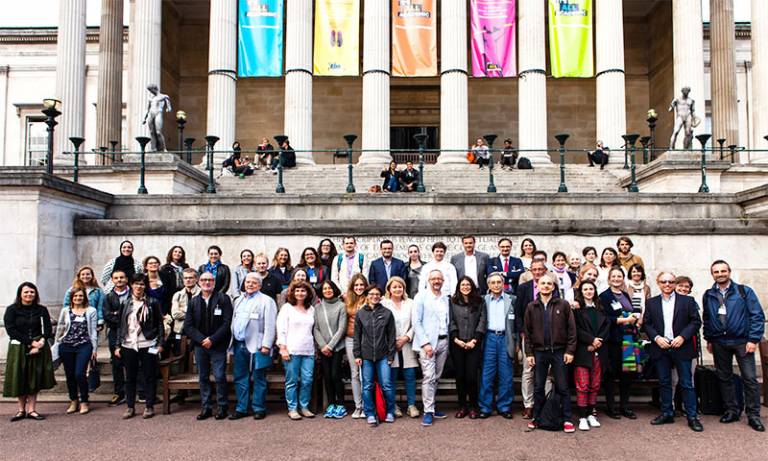NANORESTART Annual Consortium 2017
24 August 2017
In June 2017 UCL ISH, in collaboration with the UCL Eastman Dental Institute and Tate, hosted the 2nd annual meeting of the Horizon 2020-funded European project NANORESTART.

NANORESTART focuses on developing nanotechnology-based solutions for the conservation of contemporary art. Contemporary art is often more at risk of deterioration than more traditional artworks, due to the rapid deterioration of some modern materials and the fact that modern and contemporary artists tended to experiment with materials, meaning that existing conservation solutions are not relevant to their care. NANORESTART aims to develop new solutions at the cutting edge of modern chemistry and material science in an entirely new scientific framework for cleaning, protecting and monitoring contemporary art, to help preserve it for future generations.
UCL ISH is involved in many aspects of NANORESTART. Through innovative experiments in our Heritage Science Laboratory, our doctoral students Alexandra Bridarolli, Carolien Coon, Mark Kearney and Hend Mahgoub are testing the effectiveness of coatings against light damage to artworks, using hyperspectral imaging, mechanical testing and other tools to assess the impact of novel treatments for modern canvases and assessing the effectiveness of newly developed sensors at detecting volatile degradation markers from plastic artworks.
The meeting had 60 participants from 27 partner institutions all over Europe, including participants from Denmark, Germany, France, Ireland, Italy, the Netherlands, Slovenia, Spain, Sweden and the UK. NANORESTART’s partners include academics from prestigious European universities, participants from industry such as AkzoNobel and Arkema and professionals from world-leading museums such as Tate and the Rijksmuseum in Amsterdam. Over the course of 3 days, we heard updates on progress from all project partners, including exciting developments in protective coatings for plastic artworks, nanostructured fluids for cleaning sensitive surfaces, nanoparticle-based systems for strengthening materials, nano-structured based substrates for detection of modern inks and degradation products from plastics, and electrochemical sensors for detecting volatile degradation products from plastics.
Participants also had the opportunity to learn from artists about their working processes and materials at a reception evening held in conjunction with the Slade School of Fine Art, including a tour of the Slade end of year exhibition. The final event of the meeting was a visit and lecture at Tate Modern on the conservation of a vandalised Mark Rothko painting.
The meeting was a great success, and we’d like to thank all attendees for their fantastic and fascinating contributions!
For more information about NANORESTART please see: http://www.nanorestart.eu/index.php?option=com_content&view=article&id=379&Itemid=829
For more information about how UCL ISH PhD students are contributing to NANORESTART: http://www.seaha-cdt.ac.uk/people/meet-our-students/
 Close
Close

